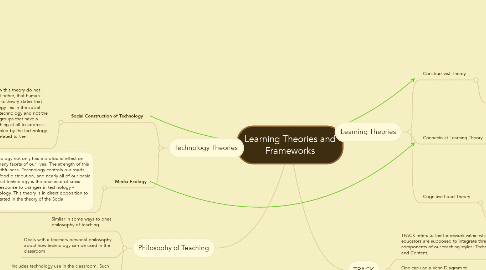
1. Technology Theories
1.1. Social Construction of Technology
1.1.1. Social Construction of Technology. People who follow this theory do not believe that technology determines human action but rather, that human action determines the development of technology. This theory states that the answer to the acceptance or rejection of technology lies in the social world. It is weak in that it only deals with the rise of technology and not the aftermath. It also makes great mention of dominant groups that have a voice in the rise of certain technologies but does nothing at all to address the voices - or lack thereof - of peoples who are affected by the technology but had nothing to do with its rise. it is very closely related to the Constructivist Learning theory.
1.2. Media Ecology
1.2.1. Media Ecology states that technology not only has a profound effect on society, but it actually controls many facets of our lives. The strength of this theory revolves in its inherent truthfulness. Technology controls our roads, communication, entertainment, food distribution, and nearly all of our basic needs. Media Ecology argues that technology is the precursor of social change. Our society evolves in response to changes in technology - especially communication technology. This theory is in direct opposition to the human centered approach stated in the theory of the Social Construction of Technology.
2. Philosophy of Teaching
2.1. Similar in some ways to ones philosophy of teaching
2.2. Deals with a teachers personal philosophy about how technology can be used in the classroom
2.3. Includes technology use in the classroom. Such as my PLN, or even how I can use technology to achieve professional development
3. Learning Theories
3.1. Constructivist Theory
3.1.1. Constructivist Theory revolves around believing that individual people make sense of the world through their creation of series of individual constructs. These constructs are the filters or lenses that we as potential learners use to view the world. An educator teaching from this perspective is accepting a role as a facilitator of education. That is to say that it is the educators job to help the student make sense of his/her interpretation of the lesson rather than impart the literal sense of the lesson.
3.2. Connectivist Learning Theory
3.2.1. Connectivist Learning proposes that knowledge exists in systems which can only be accessed through an individuals participation in activity. This theory emphasizes the importance of interacting with technology as a knowledge system. Something which I strongly agree with. This also provides and avenue in which students can learn for the sake of learning, as well as, a learning system that students can take part of outside of school.
3.3. Cognitive Load Theory
3.3.1. The Cognitive Load Theory is borrowed from cognitive psychology and is used to explain the way an individuals working memory works. One has their working memory and their long term memory, It is generally agreed that the working memory is best accessed when learners are able to build upon the existing schemas they already possess.
